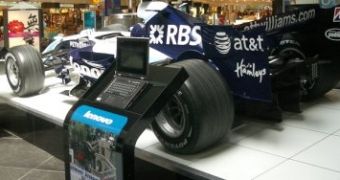High-power computing solutions provider Appro announced that it has started deploying a new supercomputer at Renault's formula 1 headquarters in Enstone. According to the company, the new supercomputer will be exclusively built with AMD's Barcelona server processors with the B3 silicon revision.
Although Formula 1 high-performance computing is an extremely small niche, the new supercomputer might tighten the competition between Intel and AMD. Formula 1 is an extremely popular and prolific business. Most of the Formula 1 competitors are using the events as simple displays of power, then transfer the existing F1 technologies into their commercial offerings.
However, the companies invest huge amounts of money in researching, designing and developing faster and more powerful racing cars. Supercomputers help designers in simulating racing conditions and adjusting the prototype's design for maximum performance.
ING Renault's F1 Team will be assisted by a 36 TFlops system, comprised of no less than 1024 sockets (Socket 1207+) for AMD quad-core Opteron processors, for a total amount of 4096 K10 processor cores. The supercomputer is powered by eight racks of 128 Opteron processors and 4.4 TB of system memory. All the racks are interconnected using the state-of-the-art Infiniband technology, for a dazzling data transfer rate of 8 GB/s.
Although Appro started deploying the new supercomputer, it won't be ready until June this year. Renault plans to use the machine for performing CFD simulations, and even for designing its upcoming R29 race car using a computing-aided-design approach.
Intel is also present on the racing industry market: while AMD teamed up with Renault and Scuderia Ferrari, Intel's technology powers the BMW Sauber F1 and Panasonic Toyota Racing teams. However, AMD seems to be the king on the Formula 1 market, as some of the teams powered by Intel run on Itanium 2 chips.
Things might change with the advent of the multi-core Nehalem chip, but the clash between the two CPU titans won't end here. AMD is currently working on its Shanghai and the Montreal 8-core processors that preserve backwards compatibility with the AM2+ socket, which would allow F1 teams to update their supercomputers faster and cheaper.

 14 DAY TRIAL //
14 DAY TRIAL //